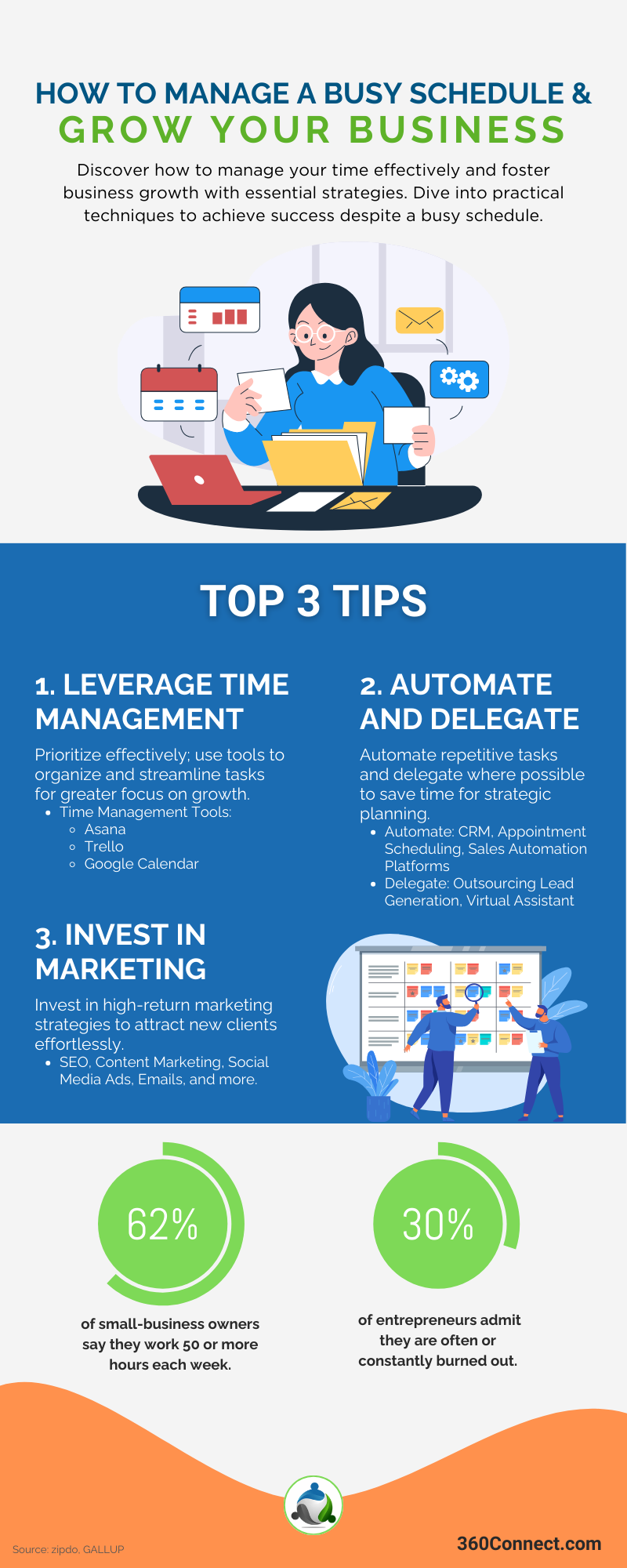Do you ever feel so caught up in managing the day-to-day operations of your business, wondering how to manage a busy schedule, that the thought of growing it seems overwhelming? It’s a common issue many business owners face. Unfortunately, this mindset can easily become a barrier to growth, making it seem like every hurdle is too high to jump over because of how busy your schedule is. But it’s crucial to recognize this pattern and understand that growth is still within reach, even when your plate is full.
Acknowledging the challenge is the first step. You might think your situation is unique, perhaps we don’t fully understand just how packed your schedule is. However, it’s important to see beyond the immediate tasks. We’re not saying you should ignore the reality of having a busy schedule; it’s about figuring out how to manage a busy schedule and finding ways to grow your business amidst this reality.
Turning Challenges into Opportunities: Practical Strategies for Growth
If you’re busy all the time and have so much to do, it can start feeling like you’re just trying to keep the lights on. It’s like every day is a race to catch up, but somehow, you’re not moving forward. This hustle might keep things going, but it can also lead to burnout. And you might miss chances to grow your business. It’s scary to think, but being too caught up in the now could mean trouble for your business’s future. We get it, breaking out of this cycle sounds tough, but don’t worry. We’re about to dive into some straightforward steps that can help you focus on growth. Even when it seems like there’s no time to spare.
Related: Sales Burnout Prevention Tips For Your Team
How to Manage a Busy Schedule
The following tips can help you expand your business without letting a busy schedule get in your way.

1. Leverage Time Management
Effective time management is key to managing a busy schedule. It starts with prioritizing tasks and understanding which actions contribute most to your growth. This might mean reevaluating your daily to-dos and identifying areas where you can improve efficiency.
Consider tools and techniques to help manage your time better. This could involve using scheduling software, setting specific time blocks for different tasks, or learning to say no to low-priority requests.
Setting clear goals can also keep you focused on what’s important. Break down your growth objectives into smaller, manageable tasks. This will make them seem less daunting and easier to fit into your busy schedule.
How to Manage a Busy Schedule with Time Management
When it comes to growing a business amid a busy schedule, leveraging the right time management tools can make a significant difference. These tools help in organizing tasks, scheduling, automating repetitive actions, and ultimately freeing up time to focus on strategic growth activities. Here’s a list of time management tools that can support your business growth efforts. And provide insight into how to manage a busy schedule effectively:
| Asana | Asana helps in creating, assigning, and tracking tasks and projects. It’s excellent for team collaboration, enabling you to see at a glance what needs to be done, by whom, and by when. | $0-$24.99per user/ month |
| Trello | Trello uses boards, lists, and cards to organize tasks and projects. It’s particularly useful for visual organizers and is great for managing workflows and project progress. | $0-$17.50per user/ month |
| Google Calendar | Google Calendar can be used for more than just meetings. It’s excellent for time blocking, allowing you to allocate specific times of the day for focused work, meetings, and breaks, ensuring you’re dedicating time to your priorities. | Free |
2. Automate and Delegate
For business owners and sales agents, the right automation and delegation strategies can significantly enhance efficiency, allowing more focus on strategic growth and client engagement. Here are a few examples of how to manage a busy schedule with automation and delegation:
Automation
Automation can be a game-changer for busy business owners looking to manage a busy schedule. Look for tasks that are repetitive and time-consuming but necessary for your business to run smoothly. Implementing software solutions for these tasks can free up a significant amount of time.
- Customer Relationship Management (CRM): Salesforce or HubSpot automates many aspects of customer relationship management. From tracking sales interactions to managing customer data and automating follow-up emails. This ensures that sales agents can focus on building relationships rather than on manual data entry.
- Appointment Scheduling: Tools like Calendly automate the process of scheduling meetings with clients, prospects, and team members. By allowing clients to book their own appointments based on your availability, you save time on back-and-forth emails.
- Sales Automation Platforms: Zoho CRM or Pipedrive offer automation features specifically designed for sales processes. These can include lead scoring, pipeline management, and performance analytics. Helping sales agents prioritize and follow up on leads more efficiently.
Delegation
Delegating is equally important. Trust your team to handle certain tasks. If you’re a small business owner or working solo, consider outsourcing to freelancers or service providers. This can help you focus on strategic growth activities instead of getting bogged down by day-to-day operations. Check out some helpful delegation examples for business owners and sales agents below.
- Outsourcing Lead Generation: Hiring a specialized agency or freelancers to handle lead generation can free up sales agents to focus on nurturing and closing deals.
- Using a Virtual Assistant for Administrative Tasks: Sales agents and business owners often get bogged down with administrative work (e.g., updating CRM entries, managing emails, and preparing reports). A virtual assistant can handle these tasks, allowing for a greater focus on sales activities and business development.
Incorporating these automation tools and delegation strategies into your business operations can streamline workflows, reduce manual labor, and ensure that the focus remains on activities that drive business growth. By identifying the most time-consuming tasks and finding efficient ways to automate or delegate them, business owners and sales agents can optimize their productivity and enhance their capacity to grow the business.
3. Invest in Marketing
Even when you’re busy, marketing should not be overlooked. It’s crucial for managing a busy schedule because it attracts new customers and helps grow your business effectively. Focus on strategies that offer the highest return on investment. This might include digital marketing efforts like SEO, content marketing, social media advertising, and working with a lead generation company.
Check out a breakdown of marketing investments you should look into to help manage a busy schedule and free up your time to expand.
- SEO (Search Engine Optimization): Outsource to an SEO agency or freelancer to enhance your website’s visibility in search engine results. Drawing more organic traffic without you having to manage the day-to-day tasks.
- Content Marketing: Consider hiring a content writer or working with a content marketing agency to produce valuable written material for your audience. This way, your brand becomes a thought leader without having to create content yourself.
- Social Media Advertising: Hiring a digital marketing agency or a freelance social media manager can help you leverage targeted ads on platforms like Facebook, Instagram, and LinkedIn, ensuring your ads reach the right audience without requiring you to micromanage each campaign.
- Email Marketing: Delegate your email marketing efforts to specialists who can design, automate, and analyze campaigns to nurture leads and encourage conversions, keeping your audience engaged with minimal input from you.
- Work with a Lead Gen Company: These companies can save valuable time by connecting you directly with potential customers interested in your products or services, utilizing their expertise to generate verified, high-quality leads.
From Plan to Practice
So, you’ve read over our tips but are still wondering how to manage a busy schedule AND expand your business. And you still feel like you’ll be way too busy to even get started on what we suggested. Well, how about we paint a picture for you of these plans in action? Let’s shift gears and imagine a scenario where these strategies unfold in the life of a busy business owner. Offering a glimpse into the tangible benefits and real-world application of our advice that can help you transform your busy schedule and facilitate business growth.
A Day in the Life: How to Manage a Busy Schedule
Imagine Jamie, a storage container supplier, swamped with daily tasks. Here’s a quick look at how Jamie can apply our strategies on how to manage a busy schedule to streamline operations and spur growth:

- Morning: Jamie reviews the day’s priorities on Trello, focusing on urgent client needs and inventory checks.
- Midday: They delegate social media and customer inquiries to a virtual assistant, clearing up the afternoon for strategic work.
- Early Afternoon: With the basics handled, Jamie turns to a lead generation company to connect with new clients actively seeking storage solutions, opening doors to markets previously untapped due to time constraints.
- Late Afternoon: This newfound time allows Jamie to research and reach out to potential manufacturing partners. Exploring opportunities to expand the product line and improve margins through better deals and innovative storage solutions.
- Evening: A quick review of the day and planning for the next with Google Calendar reveals a much more manageable and strategic approach to business operations and growth.
In just a few weeks, Jamie noticed not only smoother day-to-day operations but also the excitement of potential growth through new partnerships and an expanded customer base.
As you can see from our scenario, even when your days are packed, growth isn’t just possible—it’s within reach with the right approach.
Final Thoughts on How to Manage a Busy Schedule and Grow Your Business
Growing your business when you’re swamped with a busy schedule is challenging but definitely achievable with the right approach. By managing your time more effectively, automating and delegating tasks, and investing wisely in marketing, you can pave the way for expansion even during busy periods.
At 360Connect, we understand the importance of connecting suppliers with high-quality leads. Join us to discover how we can help you grow your business, even when time is tight. Don’t let a full schedule deter you from reaching your business goals.

